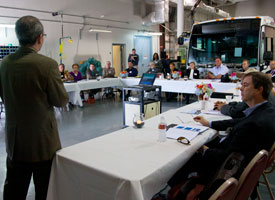When analyzed from the oil well to wheels on the ground, diesel is the single most efficient liquid transportation fuel. Combine that with rising petroleum prices and concerns about peak oil production, and it is clear that there is a real and growing need to improve efficiency and reduce emissions from diesel-powered vehicles.
Representatives from government, industry and academia gathered earlier this week to discuss these issues at the “Fuel Economy-Enhancing Technologies for Fleets” roundtable, hosted by the UH Cullen College of Engineering’s Texas Diesel Testing and Research Center. The center performs research and development of new diesel technologies and offers third-party verification of technologies developed by other groups.
About 30 people attended the event, held at the Diesel Center’s facility at the University of Houston’s Energy Research Park. Among the attendees were members of the Port of Houston Authority, the city of Houston’s Economic Development Division, the Houston Galveston Area Council, and businesses such as Williams Brothers Construction.
The roundtable started with a presentation by Michael Harold, M.D. Anderson Professor of Chemical and Biomolecular Engineering and the center’s lead researcher. His talk, “Clean Diesel: Improved Fuel Economy and Cleaner Emissions,” provided attendees with an overview of the Diesel Center’s work and of technologies that reduce emissions from diesel vehicles while maintaining or improving their fuel economy. “The modern diesel vehicle is a high-tech device,” said Harold. “Since I’m a chemical engineer, I like to call it a chemical plant on wheels.”
Following Harold’s presentation, attendees were given a tour of the Diesel Center. This included a visit to its large chassis dynamometer, which allows the center to conduct tests on heavy-duty vehicles such as busses and construction equipment; an engine dynamometer, which tests technologies and engines apart from rest of a vehicle; and a traditional laboratory, where Diesel Center researchers conduct bench-scale investigations into technologies such as new emission-reducing catalysts and biofuels.
The event concluded with a roundtable discussion, which allowed attendees to share their own thoughts and experiences with diesel vehicles’ emissions and efficiency, as well as the future of these vehicles in a world of rising energy prices.
According to Rachel Muncrief, assistant research professor with the Cullen College and director of the Diesel Center, the roundtable was a success.
“We wanted get insights from people who work with diesel vehicles every day and to spread the word about the capabilities we have at the Diesel Center,” she said. “The event allowed us to do both. We’ll continue to reach out to government and industry to work toward the creation and implementation of new technologies for diesel-powered vehicles.”
